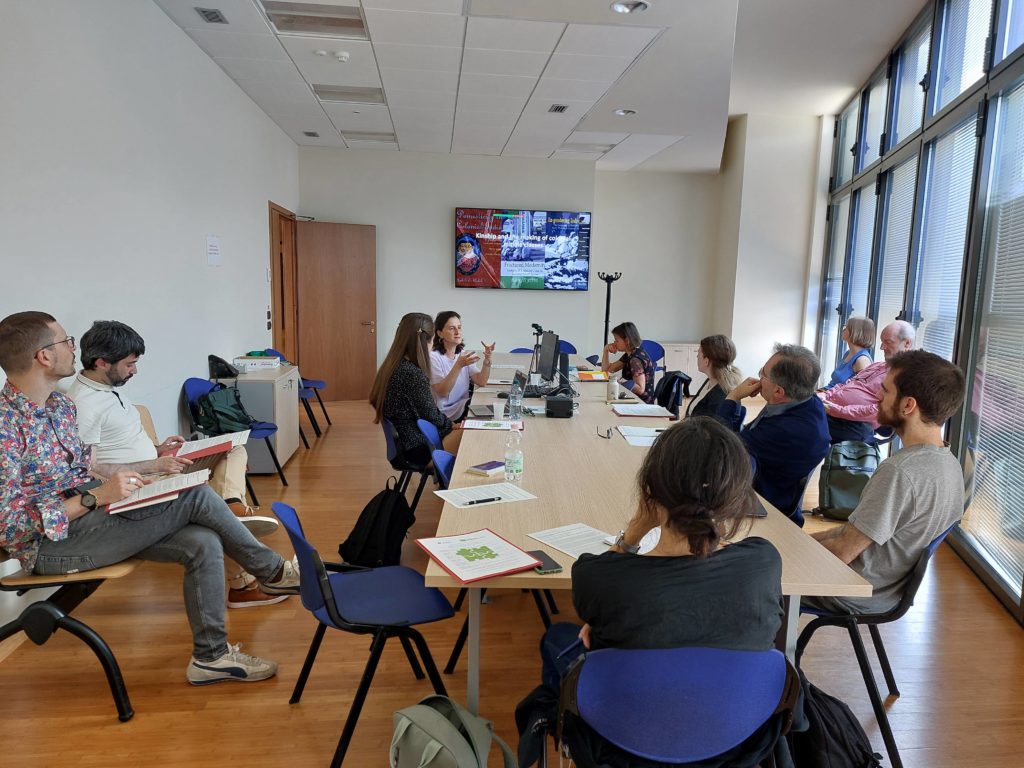Address: Palazzo Paolo Prodi, Via Tommaso Gar 14, Trento
Room: Room Piscopia
Time: 1 pm
Picture of the event

Speakers
Ester Gallo
Topic: Impure genealogies. Recalling colonialism across the public-private divide
Description: Indian political history has been inscribed into the intimate lives of many colonial subjects. Between the end of the XIXth century and the middle of the XXth, the project of a ‘modern India’ was marked, among other things, by the decline of landed aristocracy and the rise of a new and internally heterogeneous middle class. In the process, old marriage and kinship customs started to be increasingly scrutinised by colonial rulers and community reformers in the name of modernity. Novel models of love, inheritance, conjugality and parenthood were debated alongside emerging ideas of class decency and aspirations, and became important landmarks of social and economic progress. What is left of this intimate, often traumatic, past in present kinship memories? To what extent, and how, do recalling and forgetting frame contemporary class-based ideas of family relations?
This talk discusses the interlinkages between political history, kinship, and memory in the context of Indian inter-generational making of modern middle classes: it engages with the question of how colonial histories are evoked, silenced or recalled in the private domain, and the role played by the materiality of memories (diaries, genealogies, domestic objects) in forging class status. The analysis engages with two sets of debates that have often remained disconnected: on the one hand, postcolonial and feminist historical analysis of middle-class formation and, on the other, new kinship studies. While the former assume that contemporary middle classes are longing towards an idealised (pre-colonial) past, the second analyses the kinship-class nexus through either an ‘eternal present’ or a ‘linear genealogy’ framework. Both fail to empirically question the extent to which, and how, past middle-class engagement with colonial rule and with the nationalist struggle is retrieved in the present.
Based on a 10-year ethnography and archive research in India and in Indian diasporic locations, the analysis suggests the concepts of impure genealogy and kinship temporal ruptures as lens to understand the ambivalent ways in which contemporary middle classes claim responsibilities towards their past, while absolving the foreign rule of its legacy.
Bio: Ester Gallo is Associate Professor in Social Anthropology at the Department of Sociology of the University of Trento. Since 2019, she is the National Co-coordinator of Scholars at Risk Italy and member of SAR International Advisory Committee on Academic Freedom. Before joining the University of Trento in 2016, she held research and teaching positions at the European University Institute-RSCAS, Gediz University, University of Edinburgh, University of Perugia and the University of Sussex. Her research interests include migration and gender, religious diversity and pluralism, colonial history and memory, kinship and class inequality, with specific reference to Southern Europe and South Asia. She has edited Migration and Religion in Europe: Comparative Perspectives on South Asian Experiences (Routledge, 2016). She is the author of The Fall of the Gods: Kinship, Memory and Middle Classes in South India (Oxford University Press, 2017). She co-authored with Francesca Scrinzi Migrant Men, Masculinities and Reproductive Labor: Men of the Home (Palgrave MacMillan 2016). Her current research focuses on forced migration and academic displacement, and on refugee access to higher education.
Polina Zavershinskaia
Topic: Memory laws and a difficult present: the impact of the Russian invasion of Ukraine on German memory laws
Description:
The full-scale invasion of Ukraine initiated by Russia in 2022 has represented a shocking event sparking the formation of collective trauma in many European countries. For instance, German officials argued that the return of war in Europe marked a turn in European history, accusing Russia of its crimes in Ukraine. In this presentation, I focus on the sociocultural impact of the Russian invasion on the German mnemonic trajectory, centered around overcoming the German Nazi past and acknowledging Nazi crimes after Word World II, including in the former territories of the USSR and the Eastern Block. Drawing on the mixed narrative analysis, I investigated the mnemonic field of German state-sponsored memory by analyzing mnemonic narratives found in the German memory laws that were adopted in response to the invasion. The results suggest that the Russian invasion of Ukraine impacted their symbolic content, which was characterized by the paradigm change in relation to Russia and remembering its USSR legacy. I also observed the emergence of alternative memory laws, which opposed the narratives above and excused Russian actions. These dynamics indicated the polarization of the German state-sponsored memory as an outcome of the Russian invasion of Ukraine.
Bio: Polina Zavershinskaia is finishing her PhD at the Institute for Political Science, Leipzig University, Germany. She is currently a visiting scholar at the Department of Sociology and Social Research, University of Trento, Italy. In her research, she examines how far-right and authoritarian actors sacralize violence in Russian and German societies by utilizing particular narrative templates.

